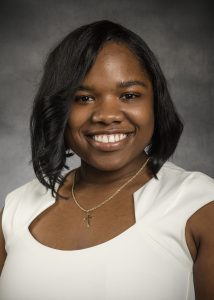When Yasamine Edwards was a teenager, she began to realize how diabetes, arthritis and poor circulation were taking a toll on her great-grandmother, who was an amputee in a wheelchair. To help family members who cared for her great-grandmother, she volunteered during her summer vacations to cook for her great-grandmother, bathe her, help her with medications and clean the wounds that formed on her leg.
“This was a big responsibility for a teen, but I learned how to properly care for someone,” said Edwards, who is now a first-year medical student at the Wright State University Boonshoft School of Medicine. “Caring for my great-grandmother helped me realize that I wanted to become a physician.”
As a dance major at the Stivers School for the Arts, a public arts magnet school in Dayton, Edwards did her best to remain focused, working hard in her classes and earning good grades. She learned about the Horizons in Medicine program at the Boonshoft School of Medicine. She applied and was accepted into the program.
The Horizons in Medicine program offers local high school students, mostly from disadvantaged or minority backgrounds, the opportunity to see firsthand the science and delivery of health care that forms the foundation for a career in medicine. The program provides Dayton-area students a sense of the career possibilities in health care and shows them the kind of serious preparation needed to enter such careers. Since 1979, more than 600 Dayton-area high school students have completed the program, with more than 90 percent entering college and about 80 percent graduating from college. Many Horizons alumni are now M.D.s, and several are enrolled in medical school at the Boonshoft School of Medicine.
For Edwards, the Horizons in Medicine Program made her feel like she could become a doctor. During the summer between her junior and senior years of high school, she spent mornings in classrooms and laboratories at Wright State, where she was introduced to subjects such as anatomy, biochemistry and physiology. She spent afternoons shadowing in hospitals, community clinics and other clinical sites throughout the Dayton community.
She learned a lot and realized that a career in medicine was more than a possibility. “The Horizons in Medicine program allowed me to gain exposure to college-level science courses. I learned that I could get through these classes successfully,” Edwards said. “I also enjoyed the shadowing experience and interacting with the medical students.”
After graduating from high school, she attended Hampton University in Hampton, Virginia, where she majored in biology and was a resident assistant. During summer break, she returned home to Dayton and volunteered as a patient escort at Good Samaritan Hospital. After earning her bachelor’s degree, she returned to Hampton University to obtain a master’s degree in medical science. Then, she returned to Dayton, where she served as a program assistant for the Horizons in Medicine program.
“I wanted to do my part in ensuring that high school students were able to enjoy the program as I had,” she said.
Now that she is in medical school at the Boonshoft School of Medicine, she is still using the mnemonic learning method that she first learned during the Horizons in Medicine program. “Using memory devices to recall large pieces of information was extremely helpful throughout my college studies,” she said. “I continue to use mnemonics to help me learn large pieces of information in my medical school classes.”
Edwards is a recipient of the Prem Batra, Ph.D., Memorial Scholarship, a Boonshoft School of Medicine scholarship for Horizons in Medicine alumni who are interested in scientific research. She is interested in researching the effect the health care reform act has had in reducing or increasing health disparities. “Research allows me to gain knowledge on how specific topics are affecting society,” Edwards said. “With this knowledge, I can implement change.”
While she is only in her first year of medical school, she wants to go into family medicine or internal medicine. Eventually, Edwards wants to practice as a primary care physician in an urban setting or an economically disadvantaged community.
“I want to make sure that everyone has the ability to get the health care they need where they live,” she said. “Some people have to drive 30 minutes or more to get what they perceive is the best health care available.”


 Wright State’s Homecoming Week features block party-inspired events Feb. 4–7 on the Dayton Campus
Wright State’s Homecoming Week features block party-inspired events Feb. 4–7 on the Dayton Campus  Wright State music professor honored with Ohio’s top music education service award
Wright State music professor honored with Ohio’s top music education service award  Wright State’s Industrial and Human Factors Engineering program named one of top online graduate programs by U.S. News
Wright State’s Industrial and Human Factors Engineering program named one of top online graduate programs by U.S. News  Student-run ReyRey Café celebrates decade of entrepreneurship at Wright State
Student-run ReyRey Café celebrates decade of entrepreneurship at Wright State  Wright State faculty member Damaris Serrano wins Panamanian literary award
Wright State faculty member Damaris Serrano wins Panamanian literary award 